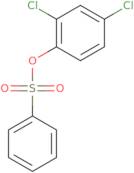Información del producto
- 2,4-Benzenesulfonic acid 2,4-dichlorophenyl ester
- 2,4-Dichlorfenylester kyseliny benzensulfonove
- 2,4-Dichlorfenylester kyseliny benzensulfonove [Czech]
- 2,4-Dichlorophenol benzenesulfonate
- 2,4-Dichlorophenyl benzenesulfonate
- 2,4-Dichlorophenyl ester of benzenesulfonic acid
- 2,4-Dichlorophenylbenzenesulfonate
- 923
- Ai3-19106
- Benzenesulfonic acid, 2,4-dichlorophenyl ester
- Ver más sinónimos
- Benzenesulphonic acid, 2,4-dichlorophenyl ester
- Brn 2944672
- Caswell No. 322
- Compound 923
- Dpbs
- EPA Pesticide Chemical Code 031001
- Em 923
- Genit
- Genite (insecticide)
- Genite 923
- Genite EM-923
- Genite-R99
- Genitol
- Genitol 923
- Hsdb 1577
- Latka 923
- Latka 923 [Czech]
- NSC 38761
- Nsc 27323
- Phenol, 2,4-dichloro-, 1-benzenesulfonate
- Phenol, 2,4-dichloro-, benzenesulfonate
- 2,4-Dichlorophenyl benzenesulphonate
- 4-11-00-00034 (Beilstein Handbook Reference)
Genite is a fatty acid that has been purified from fetal bovine serum. It is used in histochemical staining as a counterstain for hematoxylin and eosin, and it also has been shown to have some biological properties. Genite can be applied in the detection of human immunodeficiency virus (HIV) infection, which is done through the use of monoclonal antibodies. This product can be used in vitro methods by adding it to human serum or basic fibroblast cultures. Genite has been shown to inhibit growth of certain types of cancer cells when combined with other drugs such as doxorubicin or cis-platinum, but not all types of cancer cells.





